He has completed 170 marathons and five ultra marathons so far and he does not plan to retire from running anytime soon. In fact, he is a marathon collector.
Meet avid marathoner Anton Reiter, 59, who loves marathon running so much that he has even founded the 100 Marathon Club in Vienna, Austria, where he lives. Today, Anton is lying in fourth position in Austria for the most marathons completed.
Anton is a former professor, now civil servant at the Ministry of Arts and Culture in Vienna – working in IT and New Media.
I spoke to Anton recently to find out more about his love for running marathons and what spurs him on to run so many. I also got some tips from him about how he is able to run so many marathons without being injured.
Anton, I understand that you have now completed 170 marathons so far. What spurred you on to do so many?
I finished my 100th marathon in Rome on March 18th last year. Then I decided to found the 100 Marathon Club Austria. Afterwards, a sort of competition began within the club. In the end of the year 2012 one of our members reached 41 marathons, but I had “only” 26 including four ultra-marathons. So I decided to break the record in 2013, when I ran 52 marathons and one ultra. This helped me to top the charts in Austria, for running the most marathons this year.
Tell us something about your club.
I had finished 100 marathons in March 2012, so I decided to found a club of runners with the same experience. In England, Finland, Germany, Italy, the Netherlands, the US and in many countries worldwide, such unions exist. At the moment we have 26 members, 12 have finished 100 and more marathons. The leading runner has 504 reached in 28 years but he has been injured since May. The other half are candidates, they have not finished 100 marathons yet, but plan to realize this goal in the coming years.
What are your marathon timings like?
My best time in this year was 4hours 07minutes and 16seconds achieved in Chorzow, in Poland on January 1st – a couple of days before my 59th birthday. But I try to run with a (slow) pace of 6 min per km, so the average finishing time is between 4hours 20minutes and 5 hours.
How many marathons do you aim to complete before you “retire?”
I’m the chairman of the 100 marathon club Austria, and my goal is to reach 200 marathons next year. Then after that, I aim to finish 356 marathons. I want to devote one year of my life (I will be 60 at the beginning of January) to run marathons and ultras. I don’t plan to retire from marathon running yet, not at all.
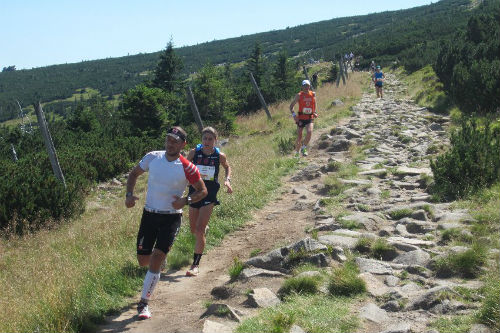
Taking part in the Sklarska Poreba Poland championship WMRA, in July 2013 (Picture courtesy of Anton Reiter)
When and why did you originally take up marathon running?
In order to lose some extra kilos I started running in the end of November 2000 at the age of 46 years. I ran my first half marathon in April 2001 and four weeks later again in Vienna, I completed my first full marathon in 4 hours 44 minutes and 20 seconds.
What do you feel is the most satisfying thing about running marathons?
Running marathons is still considered an outstanding physical and mental performance. A trained man is able to run continuously a distance of 30 km which is called “long-jog”, but to go on for a further 12.195 km to reach the marathon distance, you need endurance and a strong will. Every marathon runner is happy when passing the finish line. After 12 years of experience I must say that my greatest pleasure is to achieve a good running time. Two years ago, I have really enjoyed running trail-marathons that go up to a height of 2,400 metres. I love the mountains especially in summer – it is magical.
How do you actually find the time to run so many marathons and how often do you take part?
I only run on weekends, i.e. mostly Sundays, but this year I have run six times a double pack (two marathons a weekend). I run a marathon on Saturday, drive often hundreds of kilometres (even at night) to the next destination in Europe and run the second one 24 hours later.
How do you train for your marathons, keep fit and stay free from injuries with so much marathon running?
You won’t believe, but it is true. I don’t train at all, my training is the marathon. I published a book with 528 pages – one chapter dealing with the amount of training. It is no problem to run the marathon distance once a week (without training), if you do it either in splits or slower towards the end (i.e. very slowly during the last quarter of the run). The quicker you run, the easier you can get injured. I recover when sitting in the office during the week within hours too. My body is now used to running so much – that is the secret.
What is the biggest challenge of completing so many races?
The biggest challenge is to collect more races, like collecting stamps, telephone cards, CDs or DVDs. It could be an addiction like smoking or drinking alcohol. I like medals, finisher shirts and gifts. Marathon collectors try to finish as many marathons as possible. Malcolm Anderson writes in his book “The messengers” that worldwide, not more than 1,200 runners have completed 100 marathons, but two to three times as many people have “climbed” Mount Everest safely – so it’s not easy to collect marathons.
Which was your most memorable marathon race and why was this so?
My most memorable races were doing five marathons in five weeks during my “North American Marathon Running” in autumn 2009 (see the brochure at: http://www.rediroma-verlag.de/index.php?det=754). I ran in Portland/Maine, Chicago, Toronto, Washington D.C. and my highlight was the 40th New York City Marathon. Every marathon runner must run one time in his/her life in Manhattan. This is the most famous marathon in the world.
When and why did you start running ultra marathons?
I started running Ultra marathons last year. I wanted to find out how my body reacts when I go on running longer than the marathon distance. If you run economically (slowly) it is/has been no problem to add 10 or 14 kms for me. Last year I ran three ultras with a length of 50, 55 and 57 km, two of them having an ascent of more than 2,000 metres (the races took place in the mountains). I personally think that ultra marathon running is often easier, you have less stress because you get much more time to finish. When climbing up small paths to the top of mountains you walk a lot – walking means recovery for me. So I have much energy left to run downhills in 12 to 15 km/h.
Where and how do you usually source for your marathons to run?
I’m a repeater as well – I run the same marathon a second time or even more often if the marathon has been well organised, the course was nice and the service was perfect.
We have platforms that inform runners all about coming races like www.planet-marathon.de where I blog and report about my races. I also check the websites of 100 marathons clubs in different countries in order to find smaller races that are not mentioned on well-known sites, including www.marathonguide.com
With the amount of experience that you have, what tips can you give readers regarding marathon running?
Marathon running is a passion, you must discover the sense for it for yourself, maybe in your mind or heart. You must be willing to feel pain – and sometimes to be happy afterwards too. Don’t suffer too much when running. If you do, reduce your pace and take it easy as I do. Most marathons have cut-off times of five and a half hours in Europe and in the US it is even six hours or more – so you have plenty of time to finish.
More Related Blog Posts
- A Blind Ultra Marathon Runner Who Trains Solo
- Lessons Learned in Life Through Running
- Top Marathoner Mok Ying Ren’s and the Olympics
- Running Tips from Top Marathoner Mok
Wanna get started and be active? Check out this app.


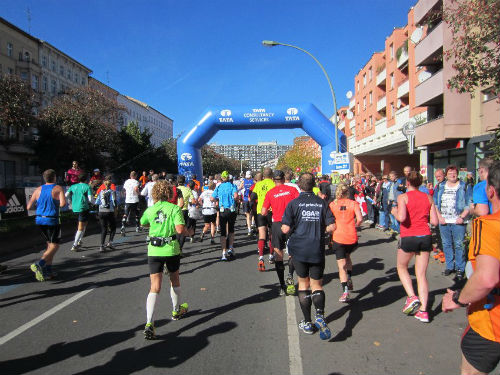
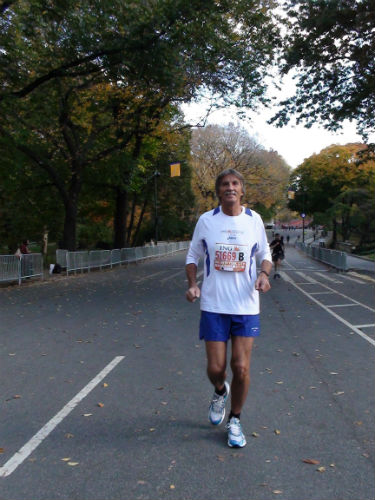
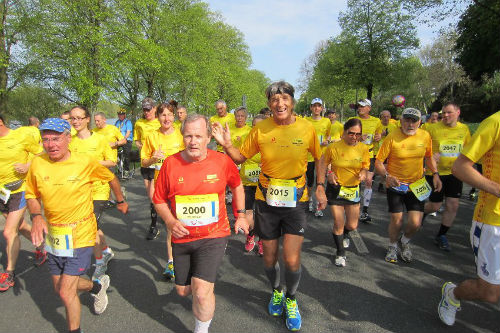
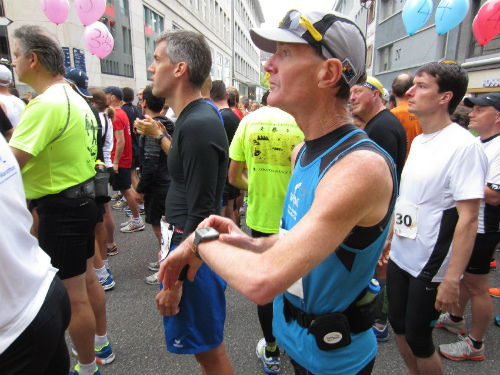
New worldwide marathon club “Marathon Globetrotter”
Dear marathon runners,
I would like to ask you for help in Austria. There is a new worldwide marathon club “Marathon Globetrotter”. This club is joining international marathon runners. Could you write information about this club in your next Newsletter or websites?
The Marathon Globetrotters is the world’s largest club of members who “collect countries” by running bona fide marathon (or ultramarathon) races in them. A person can join the club as a provisional member after completing 5 countries, and becomes a full member after completing 10 countries. There are no dues or other costs to join the club, although you may choose to buy a club singlet (kit) from the vendor who coordinates with the club. None of the money from the sale of kits goes to any club member, as the ethical rules of the club are for it to help runners, but it is not to be used for personal profit or gain. For those who can attend, the club meets once a year rotating among the continents – after the previous meeting in North America, the next annual meeting is scheduled in conjunction with the marathon in St Helier, Jersey (one of the channel islands off the coast of France, and counted as an autonomous country by the club); the race is on 4 October 2015. For more information, see http://www.marathonglobetrotters.org , and/or join the Facebook groups “Marathon Globetrotters” which is about the club and club issues, or “MG – Race Information” which is information on marathon races in different countries. Prez Rich Holmes
My name is Zdenek. I’m from Prague (Czech Republic). I’m an international marathon runner. I ran a lot of marathons in Europe (Czech Rep., Slovak Rep., Germany, Austria, Switzerland, Italy …) I ran 8 marathons in US States and Canada (Yakima River Canyon marathon, Whidbey Island marathon, Boston, NYC, Marine Corp marathon, Atlanta, Detroit and Toronto).
Many thanks for all you do for us – marathon runners
Could we stay in contact?
Yours sincerely
Zdenek
international ambasador
Marathon Globetrotters
http://www.marathonglobetrotters.org
https://www.facebook.com/zdenek.chmel.7
Hi Zdenek
Thanks for your comments.
Your enquiry on recruiting of runners has been passed to the Secretary of the 100 Marathon Club in Austria.
Pris Chew